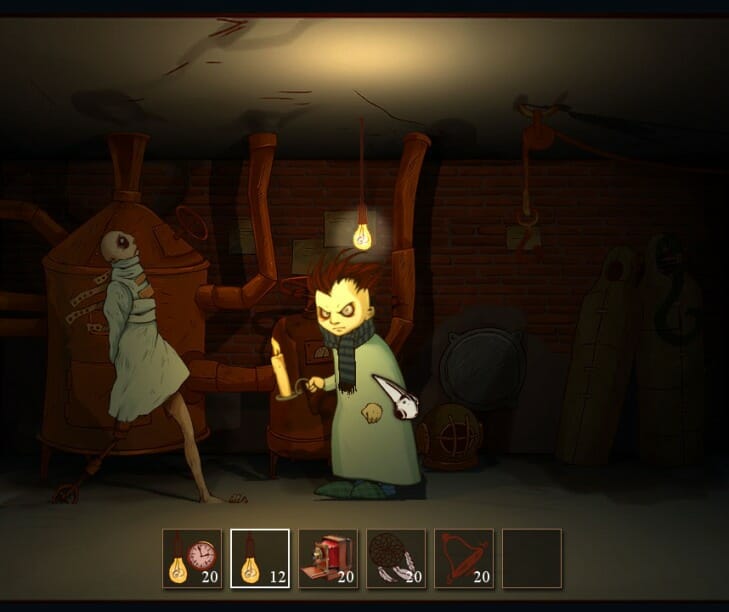
If to be afraid of darkness is to be wary of the unknown, then insomniacs encounter that void constantly. For the main character in Knock-Knock, whose only goal is to make it through the night while trying to avoid the nightmares, the darkness has to be dispelled before sleep can even begin, which makes the whole game seem fruitless in hindsight. Even if you make it through the night, there’s always the next one to look forward to.
The newest release by Ice-Pick Lodge—the Russian developer behind The Void and Pathologic—succeeds its predecessors by also being the product of sleep deprived nightmares. Although according to the opening title screen and the company’s website, the game was created based on somebody else’s dreams with little input by the studio.
The hook here that the game encourages you to believe is that somebody sent in the game to the studio, asking the team to finish what they started. It’s a predictable found footage trope and you can choose to either ignore it or give it the benefit of the doubt. From the description, you get the idea that maybe the creators don’t believe it either.
“Many strange things and unclear moments you will encounter in this—whatever it is—are due to requirements outlined in the archive,” the opening screen says. “Maybe it was just a mysterious hoax, but it probably wasn’t. We suggest you view it as just another urban legend.”
Thus the message that greets you as you open Knock-Knock fades to the home screen. Not knowing much else about the game, you click on the start button, not really having much of a choice otherwise besides quitting and remaining blissful.
You’re greeted with the wide raccoon eyes of our main character. He’s the kind of guy who doesn’t sleep too well, or maybe not at all. He seems to be haunted by something, but it’s not entirely clear what. His home or mind (sometimes it’s hard to tell) seems to be clouded with horrific images that not even he can explain, or even properly detail. He looks directly at the player, explains that he has issues sleeping, and, without missing a beat, proceeds to check all the rooms in his house, turn on lights and then wander out into the wilderness.
It’s not until much later that you even begin to realize what the game is trying to depict—it takes a while to get there. There isn’t much of a tutorial to the game’s mechanics and the language makes it difficult to gather if you’re supposed to do one thing over another. For example, when the level highlights certain rooms, it’s unclear whether you have to travel to said spaces or avoid them at all costs. A little bit of trial and error is required to make it through the night alive.
In order to do this, you have to find clocks and turn them forward in order to speed up time because in this world, time stands still. Our friend forces you into helping him survive his nightmares before the big bad comes literally knocking on the walls of his home. When the next night arrives and you have to wander into the woods, you hope to avoid the haunted asylum that makes up the bulk of the levels, but instead are met with never-ending shadows that reveal hidden specters of their own. It’s a nightmare you can’t escape, even when you’re awake. Or when you think you’re awake.
Since the points of each level seem to happen at random, it becomes hard to figure out what the game wants you to do. The ghosts don’t seem to follow any particular pattern and the main mechanic of turning on all the lights seems to stem from a dark, uncomfortable place that makes each level go painfully slow. You hope that each light bulb illuminates the clock that’s going to complete the night instead of revealing the next room you have to hide in. Combining the scavenger hunt aspects of point-and-click adventures with the essentials of childhood hide and seek makes for an overwhelming experience and half the time you’re not sure if you should continue playing or just shut it off for the night, letting your own nightmares haunt you instead of our spiky-haired friend’s wide, tired eyes.
However, if you go back to the original message, that the game is based on the ravings of a messenger that couldn’t finish it, then the garbled mess that is Knock-Knock isn’t a mess at all. The entire game is hard to think about without getting flashbacks to small, wooden rooms with creaking, cackling walls that taunt you. It’s something you remember from your childhood when you rushed under the covers after turning out the light for the night or stayed up too long and listened as the shadows in the corners of your room were restless. It resembles, well, the thoughts of an insomniac.
Knock-Knock goes beyond a simple horror game in this sense. Depicting the insanity and hallucinations that befall people with little sleep makes the player feel a little unstable. Whether or not you become frustrated with how the game is played is overshadowed by the fact that you’re probably supposed to feel wary of the events going on in the game. The repetitiveness then becomes the sad tale of insanity in the traditional sense—doing the same thing over and over again and expecting different results.
Knock-Knock was developed by Ice-Pick Lodge. It is available for the PC.
Carli Velocci is a freelance journalist in Boston, Massachusetts. She has written for DigBoston and Gameranx and isn’t afraid of anything. You can find her on Twitter @revierypone.
